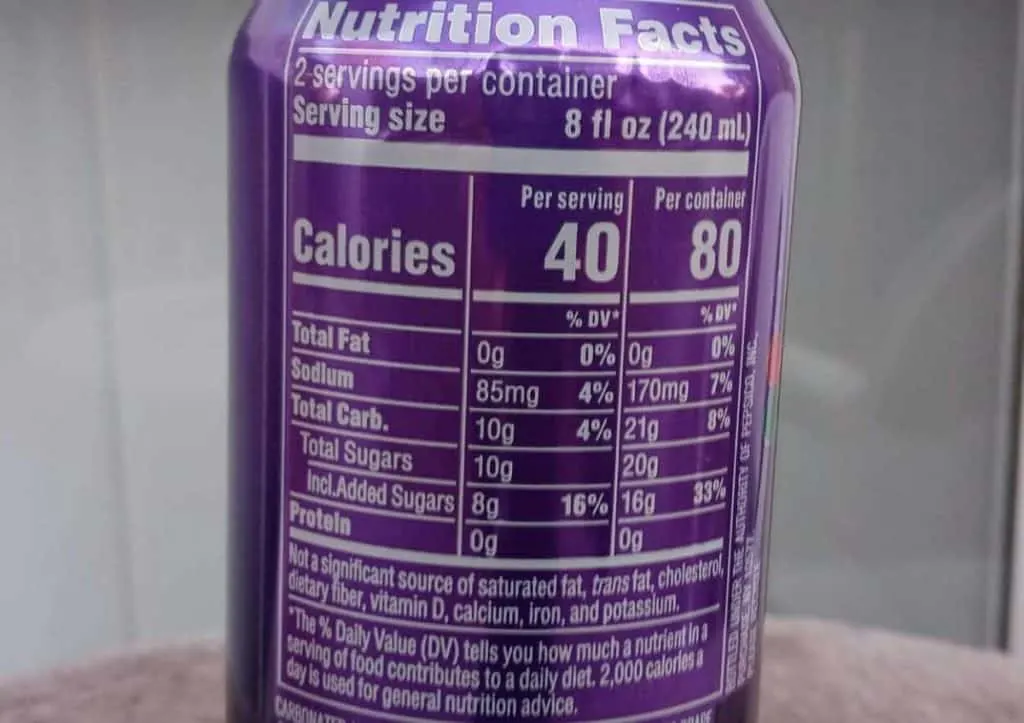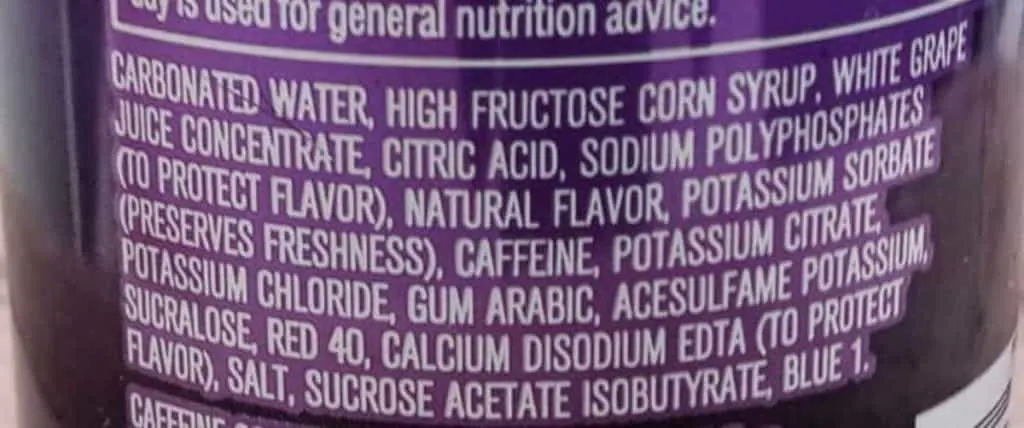From PepsiCo, Mountain Dew Kickstart is an energy drink that can kick start your day in a rejuvenating way while still maintaining its popular citrus flavor. It’s perfect for your morning run, company for your next epic adventures, and an energy booster in the middle of the afternoon.
While there’s no denying that the name Kickstart speaks for itself, just how nutritious is this energy drink for you anyway?
If you’re looking for the short answer: A regular 16fl. oz can of Mountain Dew Kickstart contains 90mg of caffeine, 80 calories, 20g of sugar and 170mg of sodium.
But of course, there’s more to discover about this energy drink which is why I’m on an adventure to unveil more about Mountain Dew Kickstart, especially its nutritional values.
So if you’re interested to find out, read on…
Contents
Mountain Dew Kickstart Nutrition Label
Let’s begin by looking at how the nutritional value of a 16 fl.oz can of Mountain Dew Kickstart compares to other energy drink brands:
| Typical Value (Standard Serving) | Mountain Dew Kickstart (16 fl.oz) | Red Bull (8.4 fl.oz) | Monster (16 fl.oz) |
| Energy | 80 calories | 110 calories | 210 calories |
| Protein | 0g | Less than 1g | 0g |
| Fat (Of which Saturated) | 0g (0g) | 0g (0g) | 0g (0g) |
| Carbohydrate (Of which Sugars) | 21g (20g) | 28g (27g) | 54g (54g) |
| Sodium | 170mg | 105mg | 370mg |
| Caffeine | 90mg | 80mg | 160mg |
| Vitamin B3 (Niacin) | – | 22mg | 46mg |
| Vitamin B6 | – | 5.05mg | 4.6mg |
| Vitamin B12 | – | 5.1µg | 13µg |

Mountain Dew Kickstart Calorie Content
Mountain Dew Kickstart contains an average amount of 80 calories per 16 fl.oz can.
With just 80 calories, Mountain Dew Kickstart doesn’t seem a lot, compared to other energy drinks like Monster Energy that has 210 calories, or Redbull with 110 calories.
As a reference, the daily recommended caloric intake for healthy adults is 2000 calories for women and 2500 calories for men. So, it’s safe to say that Kickstart won’t affect your diet much, but of course, it’s still best to be mindful of your intake.
That said, if you’re someone who practices a healthy and active lifestyle, you won’t have a problem burning off those calories. I think it’s a great drink to consume before your workout or jog.
However, you should still have a properly balanced meal and not use Kickstart, or any energy drink for that matter, as a meal replacement.
Also, you shouldn’t be abusing Kickstart’s average-calorie content as it may accidentally lead to over-consumption as it’s just as easy to tip over the daily limit. Excessively consuming Kickstart in a single day may lead to a high-calorie diet which causes health problems such as obesity, diabetes, and heart disease.
Hence, always drink your energy drinks responsibly.
Mountain Dew Kickstart Ingredients
Next, let’s take a look at what a 16fl. oz can of Mountain Dew Kickstart contains:
- Carbonated Water
- High fructose corn syrup
- White grape juice concentrate
- Citric acid
- Sodium polyphosphates (Preservative)
- Natural flavor
- Potassium sorbate (Preservative)
- Caffeine
- Potassium citrate
- Potassium chloride
- Gum Arabic
- Sucralose (Artificial Sweetener)
- Red 40 (Coloring)
- Calcium disodium EDTA
- Sucrose acetate isobutyrate
- Salt
- Blue 1 (Coloring)

How Much Caffeine Is In A Mountain Dew Kickstart?
A 16fl. oz can of Mountain Dew Kickstart contains 90mg of caffeine. That’s a quite modest amount for an energy drink its size.
A healthy amount of caffeine offers lots of benefits that include increasing your alertness, cognitive performance as well as improving your overall physical performance.
If you’re a regular caffeine drinker, the caffeine content in Kickstart may be tolerable for you as it only contains 90mg of caffeine.
For reference, a tall Starbucks cup contains 75mg of caffeine, a grande has 150mg, while a venti contains 225mg. So, it’s more than a tall but significantly less than a grande and venti order from Starbucks.
Plus, I believe that 90mg of caffeine is fair enough compared to a highly caffeinated energy drink like Monster Energy with 160mg.
But it’s also important to note that the FDA recommends a daily caffeine consumption of no more than 400mg a day for healthy adults. So, regardless of whether you have a high caffeine metabolism or not, it’s best to consume it moderately for the sake of your health.
According to Sutter Health, excessively consuming caffeine can lead to some serious health risks such as:
- Increased heart rate
- High blood pressure
- Heart palpitations
- Insomnia
- Dehydration
- Restlessness

That said, I strongly advise you to keep your daily caffeine consumption to a moderate amount and not to go overboard on the Kickstarts in a single day.
Does Kickstart have more caffeine than Mountain Dew?
While the can of Kickstart may appear like an energy drink, it really contains just 92 milligrams of caffeine. In comparison, the caffeine content in a can of Mountain Dew has 72 milligrams, while that of a can of Amp, also made by PepsiCo, is 142 mg.
Kickstart is a new beverage being distributed by PepsiCo, Inc. It tastes like Mountain Dew but is fortified with 5% juice, vitamins and a healthy dose of caffeine.
How Much Sugar Does Mountain Dew Kickstart Have?
Every 16 fl. oz can of Mountain Dew Kickstart contains 20g of sugar. That’s a rather small amount if compared to sugary energy drinks like Monster Energy which has 54g of sugar.
Mountain Dew Kickstart’s sugar content of just 20g will definitely complement your lifestyle, especially if you’re planning to cut down your sugar intake.
In my opinion, drinking a can of Kickstart won’t leave a huge impact on your diet as long as you lead an active lifestyle as it’s well below AHA‘s recommendation of daily sugar intake of 25g for women and 36g for men.
But just like caffeine, if you don’t control your sugar intake, you may be exposed to severe health problems such as:
- Tooth decay
- Acne
- Weight Gain
- Obesity
- Cardiovascular diseases
- High blood pressure
- Diabetes
Plus, you’re most likely to experience a nasty sugar crash if you regularly consume plenty of sugar in a single seating. A sugar crash will leave you feeling lethargic and slow due to the sudden drop in blood levels.
If you wish to know more about the disadvantages of consuming too much sugar, check out the video below:
All in all, if you plan on making Mountain Dew Kickstart as your go-to energy drink, it’s best to be mindful of your intake and always make sure that it’s kept to a moderate level.
Does Mountain Dew Kickstart Use Artificial Sweeteners?
There are two types of artificial sweeteners, namely sucralose and acesulfame potassium, used in a 16 fl. oz can of Mountain Dew Kickstart.
Now, you may be concerned about the use of both sugar and artificial sweeteners in Kickstart as it’s double the sweetness. Thankfully, it’s proven that sweeteners like sucralose and acesulfame potassium contain zero calorie and carbs.
Also, sweeteners are said to be about 600 times stronger than regular sugar. So you can enjoy all that sweetness without worrying about any extra calories affecting your diet. Plus, they’re FDA approved.
While sweeteners have plenty of advantages, there’s still much we have yet to discover about them, especially their potential side effects. According to this study, an excessive intake can lead to weight gain or weight loss and diabetes due to the amount of sugar that it has.
Thus, it’s always a good idea to consume them in moderation.
Is Mountain Dew Kickstart Bad for You?

Mountain Dew Kickstart isn’t bad for you, but it’s also not the healthiest option out there. So, it’s best to consume it in moderation and keep a healthy lifestyle if you plan to include this energy drink in your diet.
As an energy drink enthusiast, I would say that Kickstart is relatively healthier compared to other highly caffeinated and sugary energy drinks. But of course, this doesn’t give you the free pass to go overboard.
Kickstart energy drink contains 20g of sugar per can, which also includes several artificial sweeteners such as sucralose, acesulfame potassium.
It also contains high-fructose corn syrup (HFCS), which is a type of sweetener produced from processed corn and is usually found in soft drinks and processed food.
The Council on Science and Public and Health American Medical Association claim in this study that high fructose corn syrup is an ingredient that may lead to obesity and adverse health outcomes. It’s also said to cause fatty liver disease.
“High sugar intake can raise blood pressure and increase chronic inflammation, which also leads to heart disease.
Harvard Health (2019)
Another study also shows that HFCS could cause metabolic dysregulation and altered dopamine signalling when consumed in excess.
My advice is to have Mountain Dew Kickstart in moderation, accompanied by a balanced diet and active lifestyle. By doing this, you’ll get to enjoy its great energy boost while also keeping your health in check.
How Many Cans Of Mountain Dew Kickstart Can I Drink In A Day
I personally recommend drinking only one can of Mountain Dew Kickstart a day.
I think it’s a good option for an energy drink as it has the right amount of caffeine for a good energy boost without the risk of experiencing any unnecessary side effects.
Sugar-wise, Mountain Dew Kickstarts has a significantly lower amount compared to other brands like Monster Energy and Red Bull. So, it’s definitely the healthier option.
While consuming 20g of sugar isn’t a crime, reaching for two cans would add up to 40g in a day. I personally think it’s an unhealthy amount to have as it can lead to a sugar crash.
Hence, I strongly recommend only sticking to one can of Mountain Dew Kickstart per day to avoid putting your health and overall wellbeing at risk.
Plus, you can go for other caffeinated beverages like herbal teas or regular coffee if you feel like you’re still in need of an energy booster.
For a general overview on whether or not you should be having an energy drink every day (and if so, which ones), have a look at this insightful video below:
Is Mountain Dew Kickstart Good For You?
Given that its caffeine and sugar content is well below the permissible limits, Mountain Dew Kickstart is a top contender among energy beverages. Although Mountain Dew Kickstart isn’t harmful, it also isn’t particularly beneficial to your health.
Limiting your intake of Mountain Dew Kickstart is a good idea regardless of your caffeine tolerance, but especially if you’re sensitive to the effects of caffeine.
What Are Mountain Dew Kickstart Flavors Available?
Mountain Dew Kickstart energy drinks mainly contain real fruit juice, which gives it a pulpy and carbonated taste. Have a look at the quick list of the available flavors under this energy drink:
- Original Dew
- Orange Citrus
- Black Cherry
- Midnight Grape
- Fruit Punch
- Mango Lime
- Pineapple Orange Mango
- Blueberry Pomegranate
- Raspberry Citrus
The Verdict on Mountain Dew Kickstart
In my opinion, Mountain Dew Kickstart has been very true to its name, especially as to how they market it to everyone. With 90mg of caffeine, it makes a great energy drink to help you conquer your day.
Its average caffeine content makes it a good energy drink for those who prefer having a moderate amount of caffeine. Have a can of Kickstart before a quick run, and you’ll definitely make the most out of your workout session.
Plus, it has 20g of sugar, which I think is a significantly healthy amount to have in an energy drink. It will surely help contribute to an increase in energy level.
All in all, Mountain Dew Kickstart, if consumed in a healthy dose, is definitely better compared to the usual sugary energy drink in the market. So, why not give it a try? You may find it a perfect fit for your diet.
